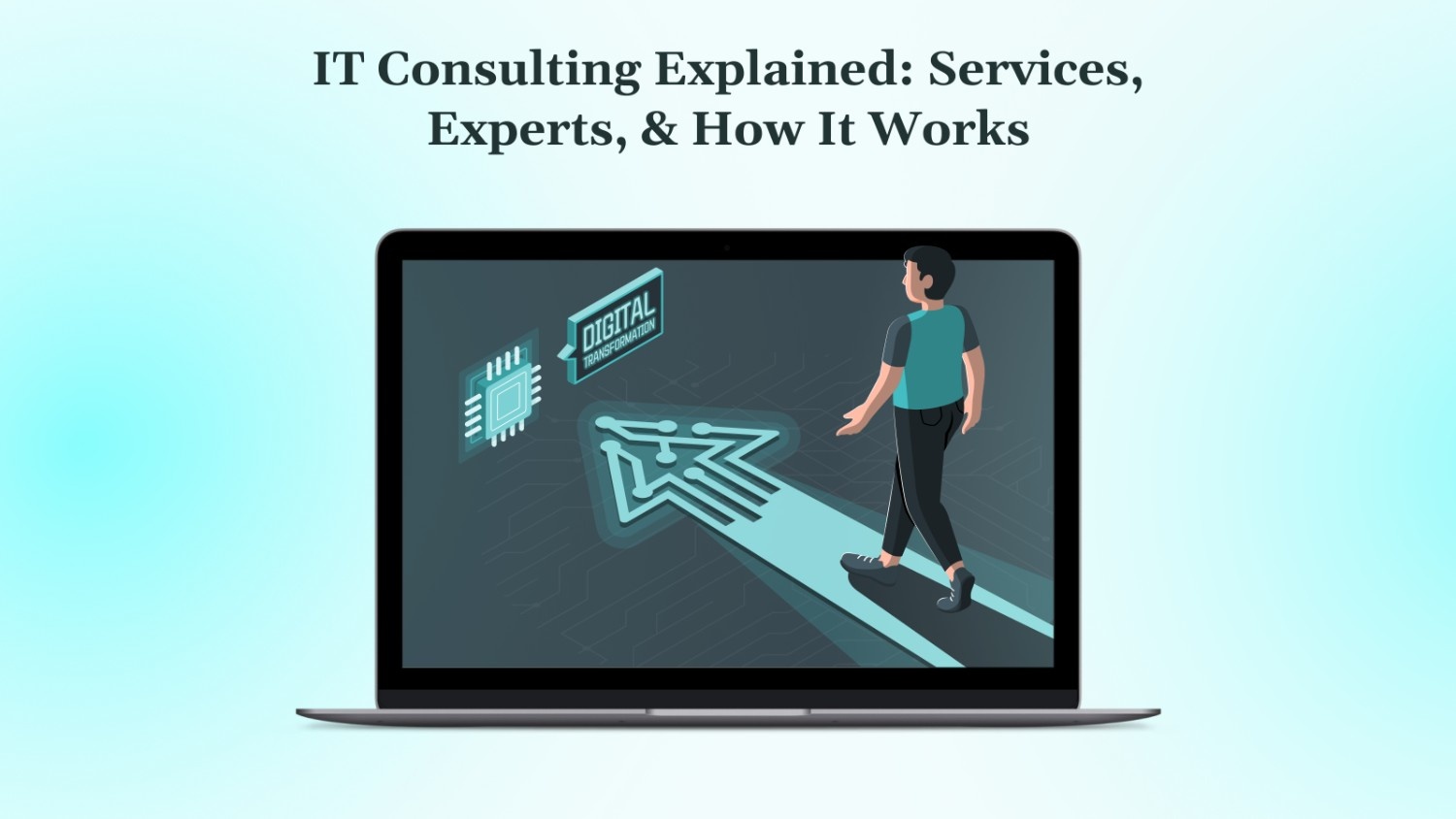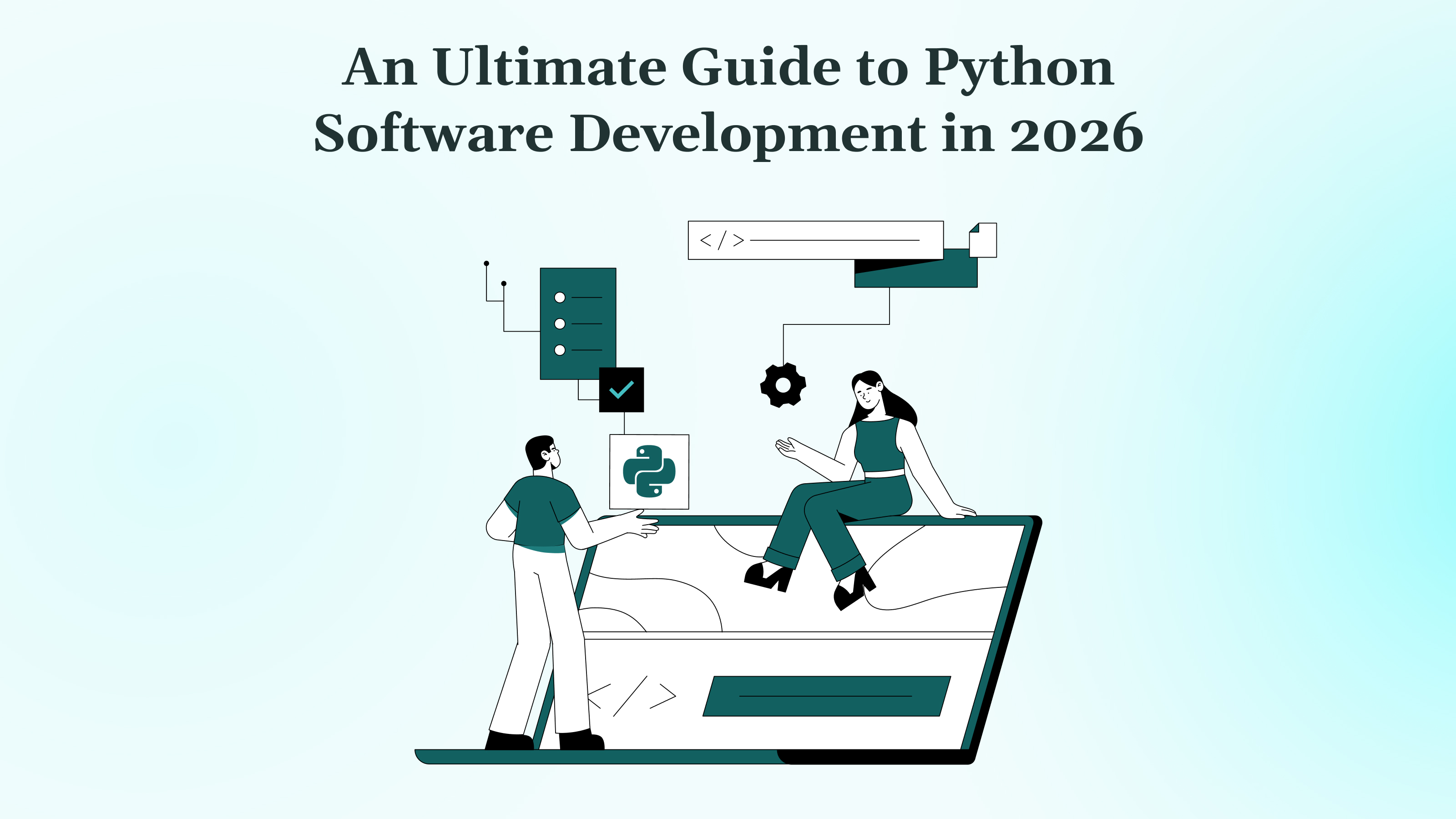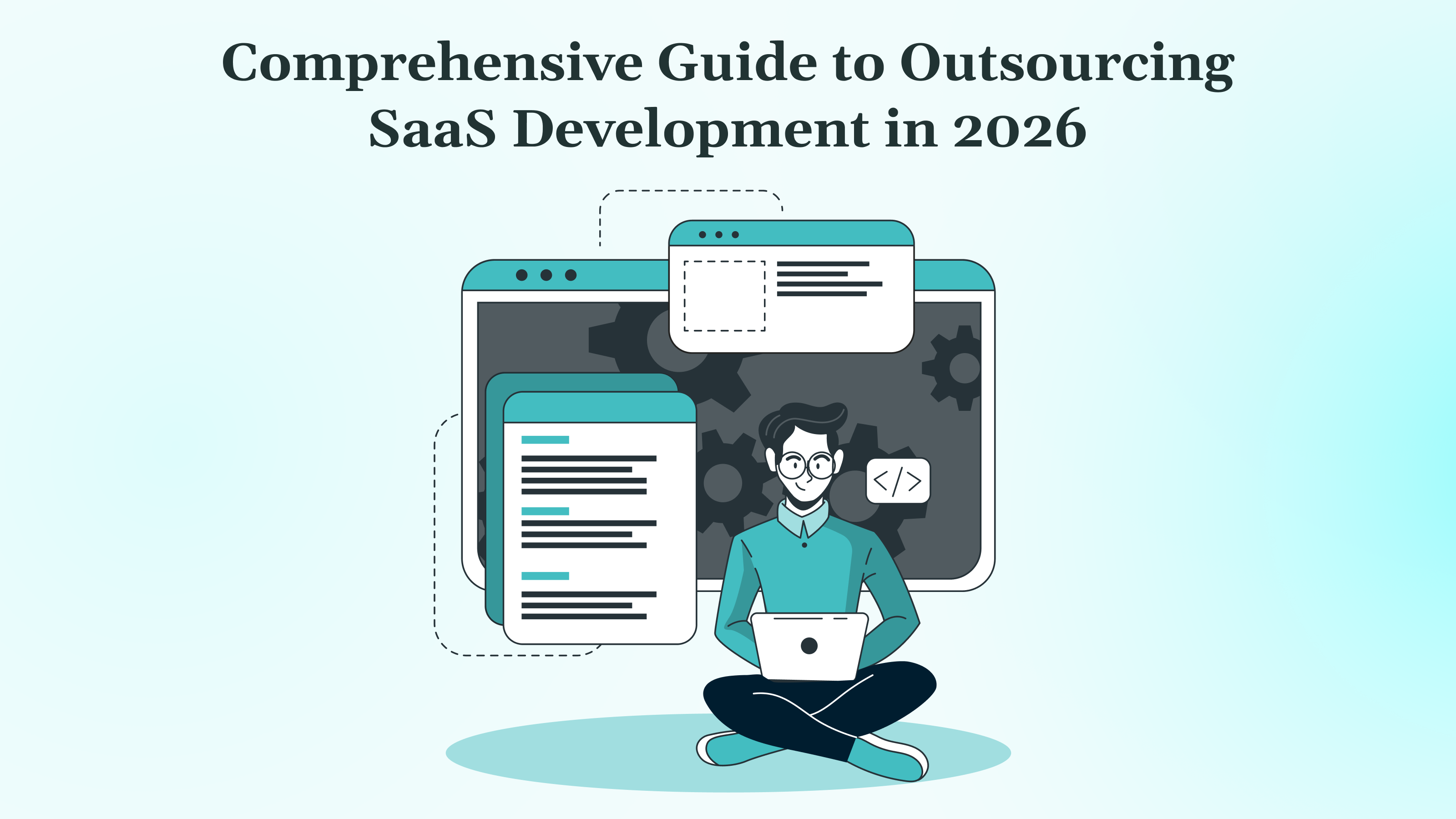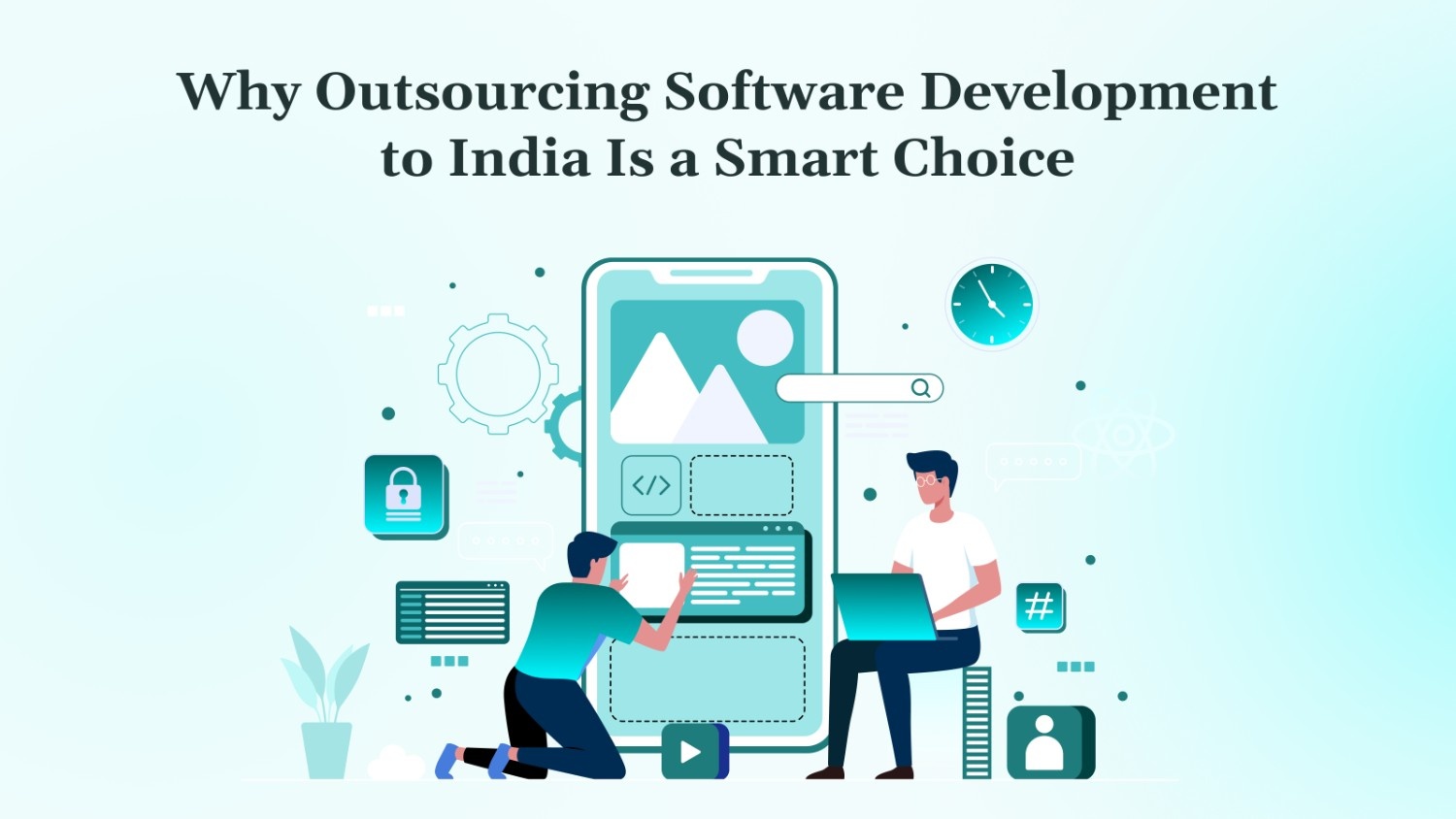Businesses today face constant pressure to adopt the right technology, control costs, and keep operations running smoothly. Without the right expertise, managing complex IT systems can quickly become overwhelming.
This is why IT consulting has become so valuable, with the industry projected to reach USD 906.47 billion by 2030. IT consulting firms offer expert guidance, technical know-how, and practical strategies to help businesses tackle technology challenges, improve processes, and meet their business goals.
In this blog, you will explore what IT consulting involves, the services it covers, the role of IT consultants, and how DEVtrust helps businesses drive better outcomes.
Key Takeaways:
- IT consulting helps businesses use technology strategically to improve efficiency, security, and overall performance.
- Solutions are tailored to address the needs of businesses across industries, covering cloud, cybersecurity, software, digital transformation, and enterprise IT.
- Consultants handle all stages from IT assessment and strategy planning to implementation, system integration, and ongoing support.
- Scalable, cost-effective, and risk-managed solutions reduce operational challenges and optimize technology investments.
- Insights and recommendations from IT consultants enable better decision-making, smoother digital transformation, and long-term business growth.
What Is IT Consulting?
IT consulting empowers businesses to use technology more effectively to reach their goals. It includes assessing a company’s needs, recommending the right solutions, and guiding implementation to boost efficiency, security, and overall performance.
The scope can range from choosing the right software to managing complex system integrations or offering ongoing support and maintenance. For companies in sectors like HealthTech, FinTech, EdTech, and Logistics, IT consulting ensures technology solutions are tailored to meet industry-specific needs and challenges.
For companies without in-house expertise or those looking to modernize their systems, IT consultants bring valuable knowledge and direction. They ensure technology investments align with business objectives and deliver real, measurable impact.
Yet, when it comes to choosing the right partner, businesses often face a dilemma: should they turn to IT consulting or tech consulting?
IT Consulting vs. Tech Consulting
IT consulting is about using technology strategically to improve business processes and align solutions with overall business goals. Tech consulting, on the other hand, deals more with specific technologies or technical challenges.
Both aim to help businesses adopt technology effectively, but their focus areas and services differ. Below are the differences between IT consulting and tech consulting.
| Aspect | IT Consulting | Tech Consulting |
| Scope | Broad, covering business processes and technology integration. | Narrow, focusing on specific technical solutions. |
| Approach | Business-centric: improving processes and overall efficiency. | Technology-centric: solving specific technical challenges. |
| Services | Infrastructure managementCloud migrationCybersecuritySystem integrationEnterprise IT solutions | Software developmentAI/ML solutionsBlockchain implementationData analyticsTechnology architecture design |
| Expertise | Broad understanding of business and IT systems. | Specialized knowledge in specific technologies or fields. |
| End Goal | Optimizing technology usage to drive business performance. | Implementing advanced technology to address specific technical needs. |
| Typical Clients | Businesses seeking to improve their overall IT infrastructure. | Companies need deep technical solutions in specific areas. |
| Project Types | Digital transformationIT strategy consultingIT system optimization | AI and machine learning projectsSoftware developmentBlockchain integration |
| Example | Assessing and optimizing an organization’s IT infrastructure for better alignment with business needs. | Developing a custom AI solution for data processing in a financial firm. |
Once you see how IT consulting stands apart from tech consulting, it becomes easier to understand why these services are so essential for modern businesses.
Why You Need IT Consulting Services?
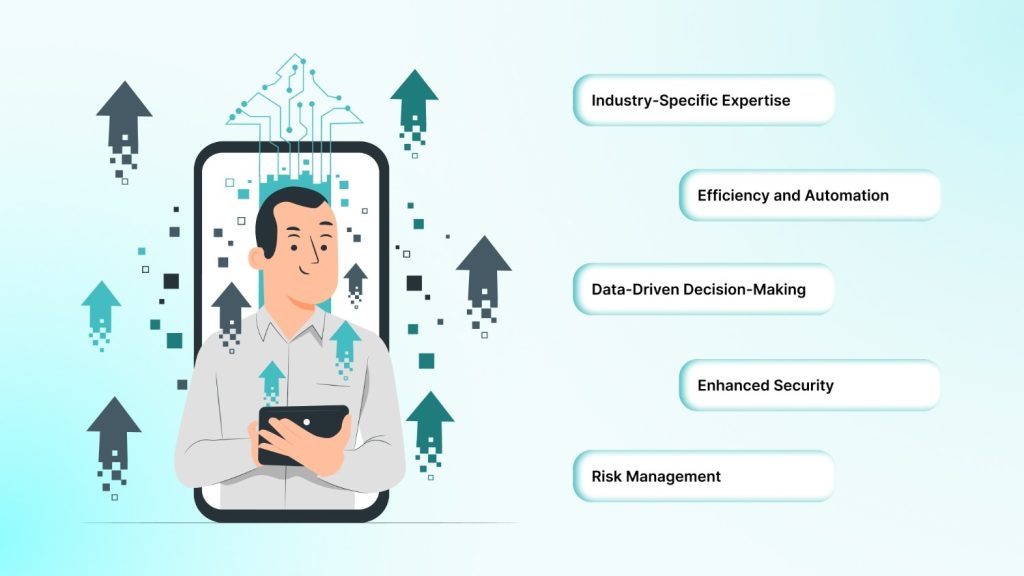
Businesses need technology to stay competitive and efficient. But managing it can quickly become complex and overwhelming, especially without dedicated in-house expertise. That is where IT consulting services make a real difference.
Here are several reasons why businesses should consider engaging with IT consulting services:
1. Industry-Specific Expertise
Each industry faces unique technological challenges that require tailored solutions. In HealthTech, FinTech, EdTech, and Logistics, IT consultants bring both industry experience and technical expertise to design systems that address specific business needs.
For example:
- HealthTech: Optimizing Electronic Health Records (EHR) systems requires a deeper understanding of healthcare regulations and data privacy laws like HIPAA.
- FinTech: Building secure and scalable financial platforms involves understanding complex regulatory requirements and integrating robust fraud prevention tools.
- EdTech: Implementing Learning Management Systems (LMS) requires knowledge of educational technologies and user experience optimization.
- Logistics: Designing real-time tracking and supply chain management systems requires expertise in data handling and system integration across multiple channels.
IT consultants understand these challenges and create solutions tailored to each sector, ensuring measurable results and alignment with business objectives.
2. Efficiency and Automation
Implementing modern IT solutions can make business operations smoother and automate tasks that would otherwise require manual effort. This boosts efficiency and minimizes human errors, giving companies more time to concentrate on strategic growth.
For example:
- In HealthTech, IT solutions can handle patient data automatically, simplifying workflows and easing administrative pressures.
- In Logistics, smart routing and inventory management tools can make operations more efficient, saving both time and resources.
By automating repetitive tasks, businesses can focus on higher-value activities while technology takes care of the routine work.
3. Data-Driven Decision-Making
IT consultants help businesses use data for better decision-making. By integrating advanced technologies like business intelligence, AI, and machine learning, businesses can make informed, data-backed decisions.
For companies in FinTech, HealthTech, EdTech, and Logistics, IT solutions enable:
- Predictive financial risk assessments in FinTech.
- Data-driven patient care decisions in HealthTech.
- Adaptive learning systems in EdTech that respond to student performance.
- Optimized supply chain management in Logistics through real-time data analytics.
IT solutions empower businesses to make smarter decisions that improve operational efficiency and customer experiences.
4. Enhanced Security
Cybersecurity threats are a risk for businesses of all sizes. Consultants assess vulnerabilities, implement strong security protocols, and ensure compliance with industry regulations to secure your data and systems.
5. Risk Management
Every tech decision carries risks such as downtime, data loss, or failures. IT consultants identify these risks early and implement strategies to minimize them, ensuring your systems remain reliable.
Beyond risk management, IT consultants provide many services tailored to different business needs.
Types of IT Consulting Services
IT consulting covers a wide range of services, each tailored to meet different technology needs within a business. Consultants bring the expertise to ensure your IT systems not only run smoothly but also align with your overall business goals.
Here are some of the most common IT consulting services:
1. Cloud Consulting
Cloud consulting helps businesses move to and manage cloud-based systems. Consultants guide everything from choosing the right provider and designing the architecture to handling migration and security. They ensure cloud usage is scalable, flexible, and cost-efficient. Key areas include:
- Cloud migration: Moving data, apps, and workloads to the cloud.
- Cloud strategy: Aligning adoption with business goals.
- Cloud security: Protecting data in cloud environments.
2. Cybersecurity Consulting
Cybersecurity services protect businesses from growing digital threats. Consultants identify vulnerabilities, set up security frameworks, and create strategies to minimize risks and maintain business continuity. Key areas include:
- Risk assessment: Spotting weaknesses in systems.
- Compliance and governance: Meeting standards like GDPR and HIPAA.
- Incident response: Preparing for and managing cyber-attacks.
3. Software Development Consulting
This service helps businesses design and implement custom software solutions. Consultants ensure the software fits business needs and integrates smoothly with existing systems. Key areas include:
- Custom application development: Building software designed for your unique requirements.
- System integrations: Ensuring new software works smoothly with existing systems.
- Software optimization: Enhancing performance and scalability of current applications.
4. IT Infrastructure Consulting
Infrastructure consulting focuses on building reliable, scalable IT environments. Consultants assess current systems, design improvements, and ensure performance across networks, servers, and data centers. Key areas include:
- Network architecture: Designing and managing strong network systems.
- Data centers: Optimizing storage and computing resources.
- Disaster recovery: Creating plans to ensure business continuity and data backup.
5. Enterprise IT Solutions
For larger organizations, consultants guide the implementation and optimization of enterprise-wide systems like ERP and CRM. They also support change management to ensure smooth adoption across teams. Key areas include:
- ERP and CRM implementation: Selecting and deploying essential software solutions.
- System optimization: Simplifying existing systems for better efficiency.
- Change management: Guiding teams to adopt new technology effectively.
6. IT Strategy and Planning
Consultants work with leadership to align IT investments with long-term goals. They create roadmaps, establish governance frameworks, and identify cost-effective solutions for future growth. Key areas include:
- Technology roadmaps: Developing long-term IT strategies.
- IT governance: Setting frameworks for decision-making and resource use.
- Budget planning: Aligning IT solutions with business budgets.
7. Digital Transformation Consulting
This service helps businesses modernize operations, improve customer experience, and stay competitive in the digital space. Consultants implement automation, analytics, and new engagement tools. Key areas include:
- Process automation: Simplifying manual tasks with digital tools.
- Data analytics: Turning data into actionable insights.
- Customer experience enhancement: Using tech to engage and satisfy customers.
8. Data Analytics & Business Intelligence (BI) Consulting
Consultants help companies unlock insights from data to drive smarter decisions. They set up analytics tools, build dashboards, and use predictive models to forecast trends. Key areas include:
- Data visualization: Creating dashboards and reports for clear insights.
- Predictive analytics: Forecasting trends based on historical data.
- Big data solutions: Managing and analyzing large datasets for advantage.
9. Managed IT Services
Ongoing IT management ensures systems run smoothly around the clock. Consultants provide proactive monitoring, updates, and support so businesses do not need to worry about day-to-day IT issues. Key areas include:
- Remote monitoring and management: 24/7 oversight of IT systems.
- IT helpdesk support: Technical assistance for employees.
- Patch management: Keeping software updated and secure.
10. IT Project Management Consulting
Consultants oversee IT projects from start to finish, ensuring they stay on time, on budget, and deliver quality outcomes. They handle planning, risk management, and execution. Key areas include:
- Project planning: Defining goals, scope, and timelines.
- Risk management: Identifying and mitigating potential issues.
- Quality assurance: Ensuring deliverables meet established standards.
Beyond ensuring projects run smoothly, IT consultants bring expertise that extends into many other areas of technology.
What Does an IT Consultant Do?
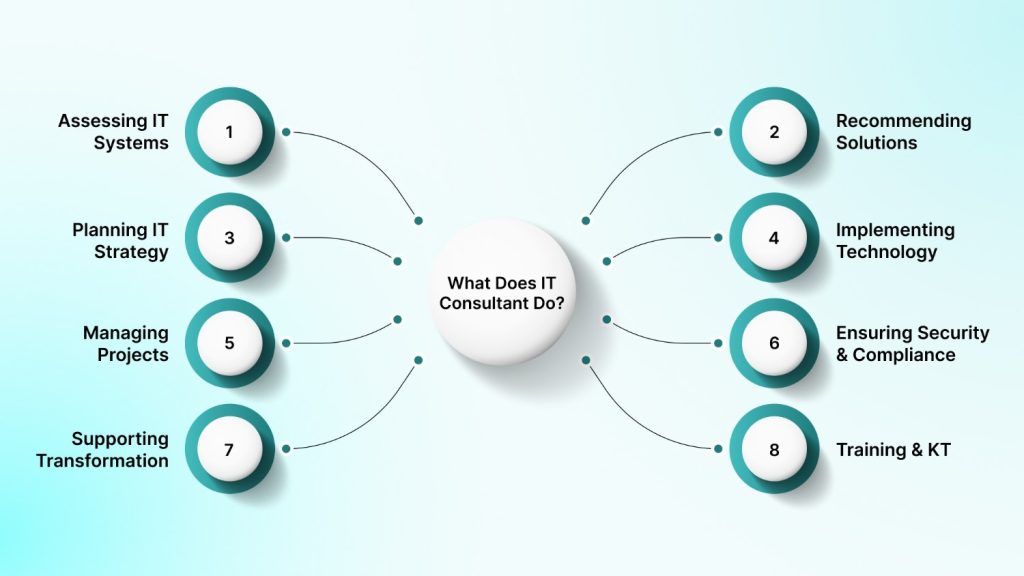
An IT consultant helps businesses make smart technology decisions and tackle IT challenges. They also design, implement, and optimize systems to ensure technology supports business goals. Here is a look at the main responsibilities of an IT consultant:
- Assessing IT Systems: IT consultants review a company’s technology infrastructure, software, and processes to spot inefficiencies, risks, or areas for improvement.
- Recommending Solutions: IT consultants recommend tailored technology solutions that enhance productivity and workflow. They consider business size, budget, and future goals to ensure the solutions are scalable and cost-effective.
- Planning IT Strategy: Consultants create technology roadmaps aligned with business goals, advising on IT investments and sharing plans for digital transformation.
- Implementing Technology: IT consultants oversee the deployment of technology solutions, including system rollouts, cloud migrations, and network configurations. They ensure everything integrates smoothly into existing workflows and operates as intended.
- Managing Projects: IT consultants often manage IT projects to ensure timely delivery, adherence to budgets, and quality outcomes. They act as intermediaries, coordinating between technical teams and business stakeholders to avoid delays and miscommunication.
- Ensuring Security and Compliance: A major responsibility is helping safeguard sensitive data and maintaining compliance with HIPAA, GDPR, or ISO. IT consultants implement cybersecurity measures, conduct system audits, and develop policies to protect against risks.
- Supporting Digital Transformation: IT consultants guide businesses in adopting modern technologies like cloud platforms, AI, and data analytics. Their focus is on enhancing efficiency, improving decision-making, and optimizing the customer experience.
- Training and Knowledge Transfer: IT consultants ensure employees can effectively use new systems. They provide training, documentation, and ongoing support to ensure a smooth transition and maximize the technology value.
At DEVtrust, we offer bespoke IT consulting services that help you design, implement, and optimize your technology to meet your business goals. From software development consulting to AI and machine learning integration, we ensure that your IT systems support long-term success.
Supporting long-term success requires the right tools. Let us look at the key technologies IT consultants use to make it possible.
Technologies Utilized by IT Consultants
IT consultants use a range of technologies to design, implement, and optimize IT solutions. These tools help them deliver customized, scalable, and secure solutions that meet each client’s needs. Here is a look at some of the key technologies they work with:
Cloud Computing Platforms
Cloud platforms provide scalability, flexibility, and cost-efficiency for modern IT infrastructure. IT consultants use them to help businesses migrate to the cloud, manage cloud environments, and use cloud-based applications. Common platforms include:
- Amazon Web Services (AWS): Offers computing power, storage, and databases.
- Microsoft Azure: Builds, deploys, and manages applications via Microsoft-managed data centers.
- Google Cloud Platform (GCP): Known for data analytics, machine learning, and scalable cloud solutions.
Cybersecurity Solutions
Protecting sensitive business data is a top priority. Consultants use cybersecurity tools to safeguard systems and networks:
- Firewalls: Filter network traffic to prevent unauthorized access.
- Encryption: Secures data so that only the authorized users can read it.
- Endpoint Security: Protects devices with antivirus and mobile device management.
- Identity and Access Management (IAM): Controls user access to resources.
Enterprise Resource Planning (ERP) Systems
ERP systems integrate core business processes like finance, HR, and inventory into one platform. IT consultants help deploy and optimize ERP systems to boost efficiency and decision-making. Popular ERP platforms include:
- SAP: Offers modules for finance, HR, supply chain, and more.
- Oracle ERP: Cloud-based solution for finance, HR, and supply chain.
- Microsoft Dynamics 365: Combines CRM and ERP capabilities for smoother operations.
Customer Relationship Management (CRM) Systems
CRM systems help businesses manage customer interactions and improve sales, marketing, and service. Consultants guide businesses in choosing and implementing CRM tools:
- Salesforce: Leading platform for sales automation, service, and marketing.
- HubSpot: Focused on inbound marketing, lead generation, and customer management.
- Zoho CRM: Affordable option for small and medium businesses.
Business Intelligence (BI) and Data Analytics Tools
Data-driven decisions are crucial for business success. Consultants use BI and analytics tools to collect, analyze, and visualize data:
- Power BI: Visualizes and analyzes data from multiple sources.
- Tableau: Creates interactive dashboards and reports.
- Google Analytics: Tracks and analyzes website traffic.
Artificial Intelligence (AI) and Machine Learning (ML)
AI and machine learning are changing the way businesses operate by enabling automation, predictive insights, and better customer experiences. Yet, despite the growing interest, only about 7% of U.S. firms have fully adopted AI, while many others are still in the planning stage.
This gap presents a significant opportunity for IT consultants to guide organizations through AI adoption and integration. By leveraging AI and ML technologies, consultants help businesses optimize operations by using:
- TensorFlow: Open-source framework for AI model development.
- IBM Watson: Offers AI services like natural language processing and machine learning.
- Google AI: Suite of tools for decision-making and process automation.
DevOps Tools
DevOps integrates development and operations to enhance collaboration, automate workflows, and speed up software deployment. Common tools include:
- Jenkins: Automation for continuous integration and delivery (CI/CD).
- Docker: Develops and runs applications in consistent containers.
- Kubernetes: Automates deployment, scaling, and management of containerized apps.
Network Management Tools
Network management tools ensure reliable, secure, and efficient networks:
- Wireshark: Monitors and troubleshoots network traffic.
- SolarWinds: Suite for detecting and resolving network issues.
- Cisco Systems: Networking equipment and software for businesses of all sizes.
Project Management and Collaboration Tools
IT projects need clear coordination and tracking. Consultants use project management and collaboration tools to simplify workflows:
- Trello: A Visual tool to track tasks and projects.
- Asana: Platform for team collaboration and project tracking.
- Slack: Facilitates real-time team communication.
While tools make collaboration easier, many businesses still wonder whether they should bring in a consultant or hire someone permanently.
Why Should You Hire an IT Consultant Over a Permanent Hire?
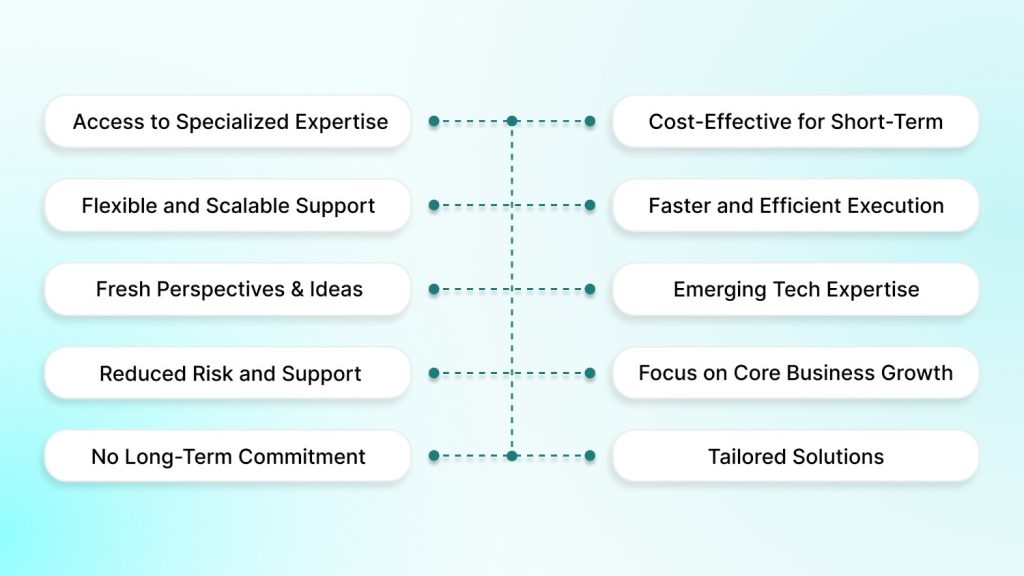
Deciding whether to hire an IT consultant or a full-time IT employee is an important choice for any business. While permanent staff provide long-term stability, IT consultants offer unique advantages, especially for businesses that need specialized expertise, flexibility, and cost-effective solutions.
Here is why IT consultants can be the smarter option:
- Access to Specialized Expertise: IT consultants bring high-level, industry-specific knowledge without the need for a long-term hire. They provide tailored solutions for complex challenges like cloud migration or custom cybersecurity strategies.
- Cost-Effective for Short-Term Needs: Hiring full-time IT staff can be costly, especially for short-term or specialized projects. For consultants, you pay only for the services you need, without salaries, benefits, or training costs.
- Flexible and Scalable Support: IT consultants can adjust their involvement based on your business needs. They provide flexibility that permanent staff may not offer.
- Faster and Efficient Execution: IT consultants can quickly address complex IT challenges as they are experienced in handling projects of all sizes. They simplify execution and shorten project timelines.
- Fresh Perspectives and Innovative Ideas: Consultants offer an objective view of your technology strategy. They spot inefficiencies and suggest creative solutions that may not be obvious to long-term in-house teams, helping drive innovation.
- Expertise in Emerging Technologies: Keeping up with the latest tech trends can be challenging for permanent employees. IT consultants specialize in cloud platforms, AI, and machine learning, helping businesses stay competitive and efficient.
- Reduced Risk and Compliance Support: Consultants help identify risks and ensure systems meet regulatory standards like GDPR or HIPAA. They implement secure systems that protect data and reduce legal or financial exposure.
- Focus on Core Business Growth: By handling technical challenges, IT consultants free internal teams to focus on product development, marketing, and customer service.
- No Long-Term Commitment: Unlike permanent employees, consultants can be engaged on a project-by-project basis. This flexibility allows businesses to access expertise without ongoing obligations or overhead costs.
- Tailored Solutions Without Added Burden: IT consultants manage the entire implementation process, including project management, vendor coordination, and resource allocation. This ensures smooth execution without overloading your internal team.
While consultants handle execution smoothly, the real challenge for businesses is knowing when their involvement becomes most valuable.
When is the Right Time to Hire an IT Consulting Firm?
Hiring an IT consulting firm is a strategic move that can help your business tackle complex technology challenges, improve systems, and stay competitive.
While an in-house IT team may handle daily operations, there are certain situations where a consulting firm can add real value. Here are some scenarios where hiring an IT consulting firm makes sense:
- When you need Specialized Expertise: If your business requires cloud migration, cybersecurity improvements, or the implementation of AI/ML models, IT consultants deliver tailored solutions beyond the capacity of an in-house team.
- When you are planning a Digital Transformation: IT consultants help you choose the right technologies, manage change, and integrate new systems smoothly. They ensure your transformation aligns with long-term business goals and keeps you competitive.
- When you are Scaling Your Business: Consultants assess current systems, identify gaps, and implement scalable solutions to handle increased operations, optimize networks, and strengthen data security.
- When you Lack In-House Expertise: Consultants help fill knowledge gaps. They handle system setup, software integration, and regulatory compliance, allowing you to concentrate on core business activities.
- When you are facing Security or Compliance Challenges: IT consultants protect sensitive data and ensure regulatory compliance. They assess vulnerabilities, design security frameworks, and ensure adherence to GDPR, HIPAA, or PCI-DSS standards.
- When you need a Fresh Perspective: External consultants offer objective insights, identify inefficiencies, and recommend innovative solutions that internal teams might overlook. They help refresh IT strategy and align technology with business objectives.
- When you have Large-Scale IT Projects: For complex projects, such as ERP implementation, multi-software integration, or infrastructure migration, consultants manage the full project lifecycle, ensuring timely and on-budget delivery.
- When you need to Optimize Existing Systems: Consultants assess and improve current IT systems for software upgrades, process automation, security enhancement, or infrastructure optimization.
- When you want to focus on Core Business Activities: By outsourcing IT tasks to consultants, internal teams can focus on strategic priorities. Consultants handle routine IT operations, implementation, and ongoing support, freeing you to grow your business.
- When you are managing Technological Change or Upgrades: IT consultants guide system selection, deployment, and integration while providing staff training, ensuring a smooth transition with minimal disruption.
Once you understand the role consultants play in technology adoption, the next step is to look at how the consulting process actually works.
Also Read: The Definitive Guide To IT Outsourcing
How IT Consulting Works: A Detailed Step-by-Step Blueprint
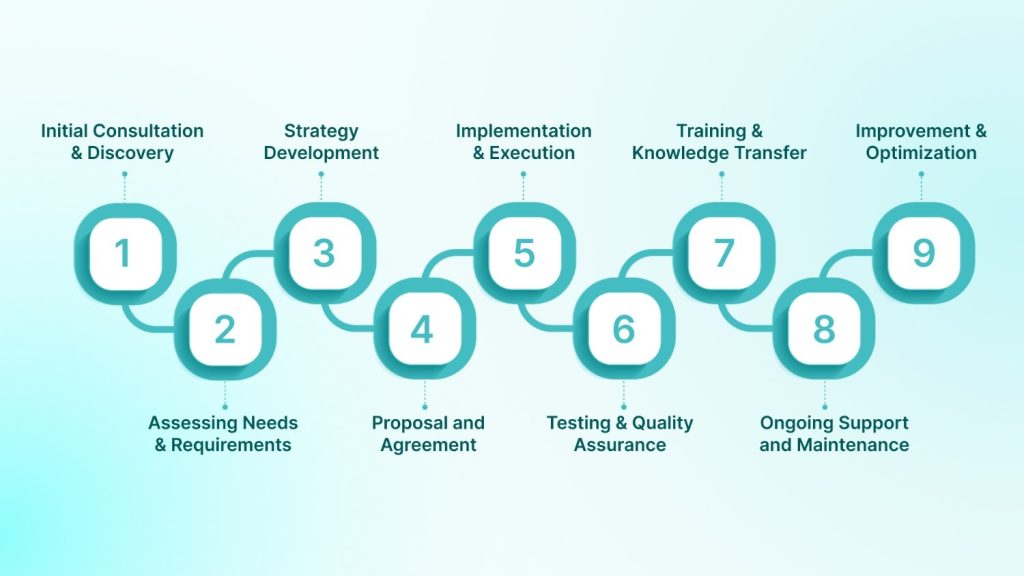
IT consulting is a strategic process where businesses work with external experts to assess, design, implement, and manage their technology systems. The process follows several stages, each focused on delivering customized, scalable, and effective IT solutions.
Here is a step-by-step blueprint of how IT consulting works:
1. Initial Consultation and Discovery
The IT consulting process starts with an initial consultation, where the consultant meets with business stakeholders to understand their goals, challenges, and current IT setup. This step ensures a clear picture of the company’s needs. Key activities include:
- Understanding business goals: Discussing how technology can support strategic objectives.
- Identifying challenges: Spotting IT-related issues like inefficiencies, security gaps, or system limitations.
- Evaluating existing systems: Reviewing current infrastructure and software to find weaknesses or areas for improvement.
Industry Use Cases:
- HealthTech: Consultants help healthcare organizations assess their EHR systems to identify inefficiencies or compliance risks (e.g., HIPAA).
- FinTech: Consultants assess payment processing systems, security protocols, and scalability for fintech startups and banks.
- EdTech: Consulting for LMS platforms, ensuring alignment with educational goals and scalability for growing online education providers.
- Logistics: Reviewing existing supply chain management systems to identify potential bottlenecks or inefficiencies.
2. Assessing Needs and Requirements
Next, the consultant goes deeper into the company’s IT needs, gathering detailed technical requirements and analyzing current systems. This step includes:
- Gap analysis: Comparing existing infrastructure with business goals and industry best practices.
- Requirement gathering: Defining technical needs for better performance, security, or scalability.
- Risk assessment: Identifying vulnerabilities, compliance gaps, or cybersecurity risks.
Industry Use Cases:
- HealthTech: Performing risk assessments on telemedicine platforms, identifying areas for HIPAA compliance and data protection.
- FinTech: Analyzing financial transaction systems for vulnerabilities and regulatory compliance.
- EdTech: Gathering requirements for building interactive learning systems that support personalized learning and scalability.
- Logistics: Assessing inventory and route optimization systems to enhance operational efficiency.
3. Solution Design and Strategy Development
With requirements in hand, the consultant creates a tailored solution aligned with the business strategy. Key tasks include:
- Solution design: Outlining recommended IT solutions like software, infrastructure upgrades, or cloud migration.
- Technology selection: Choosing the best tools and platforms based on cost, scalability, security, and compatibility.
- Strategic roadmap: Creating a detailed implementation plan with timelines, resources, and milestones.
Industry Use Cases:
- HealthTech: Designing secure and scalable cloud-based health information systems that ensure compliance and data privacy.
- FinTech: Developing fraud prevention tools and real-time payment processing systems.
- EdTech: Creating scalable and flexible LMS solutions that integrate with existing tools and student data systems.
- Logistics: Designing real-time supply chain visibility solutions that connect with ERP systems to improve tracking and reporting.
4. Proposal and Agreement
The consultant presents the proposed solution to stakeholders, ensuring it meets business goals and budget. This phase includes:
- Presenting the solution: Explaining the strategy and expected benefits.
- Refining the approach: Incorporating stakeholder feedback.
- Contractual agreement: Finalizing deliverables, costs, and timelines.
Industry Use Cases:
- HealthTech: Finalizing plans for a telehealth platform that integrates seamlessly with existing healthcare systems.
- FinTech: Presenting a proposal for a cloud-based security platform to protect sensitive financial data.
- EdTech: Finalizing the approach for a digital classroom solution that supports collaboration and content management.
- Logistics: Proposing a solution for optimizing delivery routes and improving fleet management efficiency.
5. Implementation and Execution
This phase focuses on deploying and integrating the IT solution. Key steps include:
- Project management: Overseeing tasks, timelines, and resources while keeping stakeholders updated.
- System installation: Setting up hardware, software, or cloud solutions.
- Integration: Ensuring smooth communication with existing systems.
- Custom development: Managing development and testing if custom applications are needed.
Industry Use Cases:
- HealthTech: Implementing an integrated EHR solution with medical devices and telemedicine platforms.
- FinTech: Deploying secure payment gateways and ensuring compliance with financial regulations.
- EdTech: Integrating AI-powered adaptive learning tools into an existing LMS platform.
- Logistics: Installing real-time tracking systems that communicate with delivery management tools.
6. Testing and Quality Assurance
Once implemented, the system is thoroughly tested to ensure it works as intended. This includes:
- System testing: Checking performance, security, and load handling.
- User acceptance testing (UAT): Ensuring the system meets user expectations.
- Quality assurance: Confirming the system is bug-free and ready for full deployment.
Industry Use Cases:
- HealthTech: Testing the integration of new patient management systems with hospital databases and devices.
- FinTech: Performing security tests to validate the safety of financial transaction systems.
- EdTech: Ensuring the scalability and reliability of a new LMS platform before a full rollout.
- Logistics: Testing the real-time capabilities of inventory and route optimization systems.
7. Training and Knowledge Transfer
After testing, the consultant trains the internal team to manage and use the system effectively. This involves:
- User training: Teaching employees to use new tools or software efficiently.
- Documentation: Providing guides for troubleshooting, maintenance, and usage.
- Knowledge transfer: Equipping the internal team to maintain and scale the system independently.
Industry Use Cases:
- HealthTech: Training healthcare staff to use new EHR systems and telemedicine platforms.
- FinTech: Educating financial teams on how to use the new fraud detection system and customer management tools.
- EdTech: Offering training on the new adaptive learning system to faculty and administrators.
- Logistics: Providing training for logistics teams on using real-time tracking systems and reporting tools.
8. Ongoing Support and Maintenance
IT consulting continues after implementation through support and maintenance:
- Monitoring: Keeping systems running efficiently and securely.
- Troubleshooting: Addressing bugs or performance issues.
- Upgrades and updates: Ensuring systems stay current with new features and security patches.
Industry Use Cases:
- HealthTech: Ongoing monitoring of telemedicine systems to ensure security and compliance with healthcare standards.
- FinTech: Regular updates to fraud detection algorithms to adapt to new financial trends and threats.
- EdTech: Maintenance of adaptive learning systems to ensure they evolve with changing educational needs.
- Logistics: Ongoing optimization of supply chain management systems based on real-time performance data.
9. Continuous Improvement and Optimization
Consultants help businesses enhance systems over time:
- Performance analysis: Reviewing system efficiency and identifying improvements.
- Scalability assessments: Ensuring the system grows with the business.
- Feedback loops: Using user input to refine and optimize solutions continuously.
Industry Use Cases:
- HealthTech: Continuously improving patient data processing systems to enhance patient care and operational efficiency.
- FinTech: Analyzing transaction systems to refine fraud detection models and improve transaction accuracy.
- EdTech: Updating adaptive curricula models to reflect new academic standards and evolving teaching methods.
- Logistics: Fine-tuning supply chain optimization models based on new traffic patterns and delivery data.
While refining systems over time adds long-term value, the real impact comes when consulting services are customized for specific industries.
Industry-Specific IT Consulting
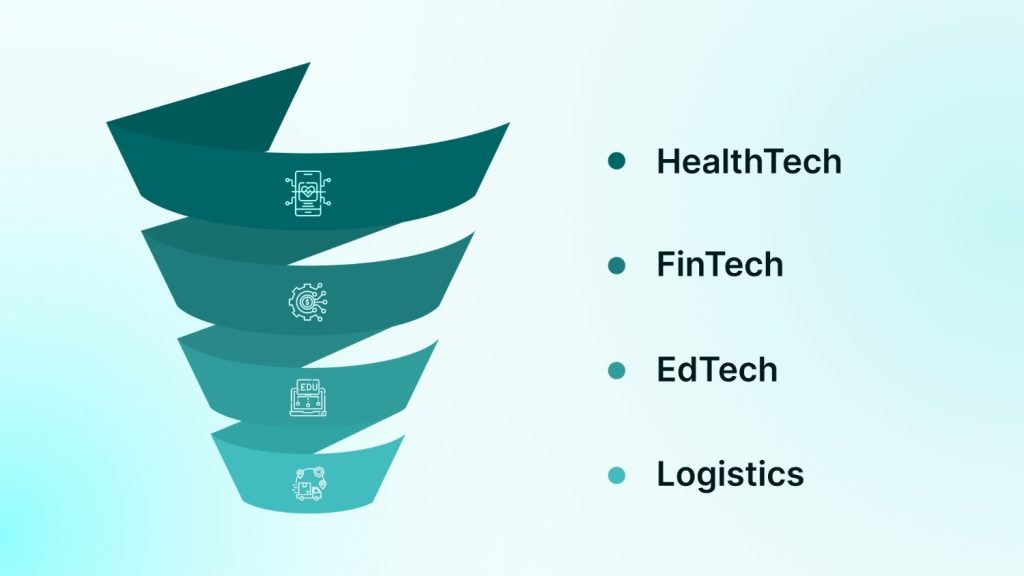
IT consulting provides tailored technology solutions that address specific challenges across various industries. By using their deep industry knowledge and technical expertise, IT consultants help businesses simplify operations, improve efficiency, and drive innovation.
Here is how IT consulting is transforming key sectors:
1. HealthTech: Enhancing Patient Care and Operational Efficiency
In the HealthTech sector, IT consulting plays a crucial role in optimizing healthcare systems, improving patient care, and ensuring compliance with industry regulations. IT consultants help healthcare providers:
- Optimize Hospital Operations: Simplify patient flow, manage resources, and automate scheduling to improve hospital efficiency.
- Enhance Data Management: Develop secure, scalable systems for managing electronic health records (EHR) and telemedicine platforms.
- Ensure Compliance: Implement HIPAA-compliant IT solutions for managing patient data and healthcare workflows.
DEVtrust’s Expertise: Our specialization in designing and implementing secure IT solutions for HealthTech ensures compliance and improves operational efficiency for healthcare providers.
2. FinTech: Strengthening Security and Simplifying Financial Processes
FinTech is a rapidly evolving sector where IT consultants ensure that financial institutions stay secure, compliant, and competitive. IT consultants help businesses in FinTech:
- Improve Fraud Detection: Implement advanced IT systems for real-time fraud detection, safeguarding transactions and customer data.
- Optimize Financial Systems: Enhance payment processing systems, loan management platforms, and transaction tracking for efficiency and security.
- Support Compliance: Help financial institutions stay up to date with regulatory standards like PSD2, GDPR, and other financial regulations.
DEVtrust’s Expertise: We provide IT consulting to help FinTech companies strengthen security, streamline financial systems, and stay ahead of regulatory requirements.
3. EdTech: Personalizing Education and Improving Learning Outcomes
In EdTech, IT consultants create solutions that help educational institutions deliver personalized learning experiences while simplifying administrative tasks. Key applications include:
- Learning Management Systems (LMS): Develop scalable LMS platforms to improve content delivery, student engagement, and performance tracking.
- Student Data Management: Build systems for tracking student progress and providing personalized learning paths.
- Automated Grading and Analytics: Implement AI-driven tools to automate grading and analyze student data for better decision-making.
DEVtrust’s Expertise: We work with EdTech companies to implement robust IT solutions that improve learning experiences and optimize educational management systems.
4. Logistics: Simplifying Operations and Enhancing Efficiency
In the Logistics sector, IT consultants help companies optimize their supply chain, improve route planning, and reduce operational costs. IT consultants help logistics companies:
- Optimize Supply Chains: Implement predictive analytics to forecast demand and manage inventory more effectively.
- Improve Route Planning: Design real-time route optimization systems to improve delivery efficiency and minimize fuel consumption.
- Enhance Fleet Management: Create systems for real-time fleet tracking, ensuring on-time deliveries and reducing operational delays.
DEVtrust’s Expertise: We specialize in IT solutions for logistics companies, helping them simplify operations, improve route planning, and better manage supply chain demands.
An effective way to understand the value of IT consulting is through a case study that highlights its real-world impact.
Case Study: Payvantage – Simplifying Financial Operations with Custom IT Solutions
Payvantage is a fintech startup focused on simplifying financial processes for small businesses by providing smooth payment solutions and financial management tools.
Payvantage faced significant challenges in managing financial transactions, scaling infrastructure, and integrating modern technologies.
Challenges
- Legacy Systems: Payvantage was using outdated technology that caused errors and inefficiencies in financial operations.
- Scalability Issues: Their existing infrastructure struggled to support increasing transaction volumes and growing user demands.
- Integration Difficulties: Integrating with modern APIs and third-party services, like payment gateways, was cumbersome and time-consuming.
Solutions Blueprint
DEVtrust designed and implemented custom IT solutions to address Payvantage’s challenges and enhance its operational efficiency:
- System Modernization: Re-engineered the core platform to a microservices architecture, improving scalability and enabling easier maintenance.
- API Integrations: Integrated with Plaid API to enable secure, efficient bank account linking and transaction data retrieval.
- Cloud Migration: Migrated the infrastructure to AWS, ensuring high availability, performance, and a more cost-effective solution for future growth.
Results
- 50% More Accurate Bank Verification: Smarter verification systems improved accuracy by 50%, making approvals faster and more dependable.
- 95% On-Time Payment Compliance: Achieved 95% compliance in timely payments, strengthening trust and financial reliability.
- 20% Growth in Loan Approvals: Simplified processes increased loan approvals by 20%, helping more customers access credit with ease.
- 35% Fewer Late Payments: Enhanced repayment systems cut late payments by 35%, ensuring healthier cash flows.
With a strong microservices architecture, Payvantage was able to scale its infrastructure smoothly to support growing transaction volumes.
Ready to implement tailored IT solutions for your business? Contact us today to discover how we can optimize your technology infrastructure and simplify your operations with expert IT consulting services!
After seeing how IT consulting works in practice, the next step is figuring out how to choose the right partner for your business.
Also Read: Complete Guide to Outsourcing Software Development in 2025
Choosing the Right IT Consulting Partner
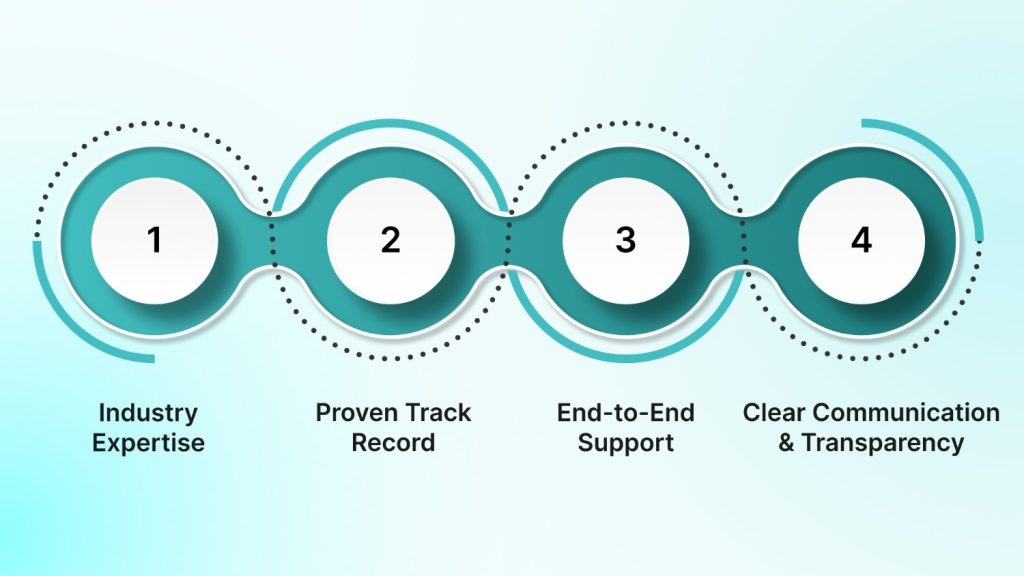
Selecting the right IT consulting firm is essential to ensure that your tech projects are executed successfully. The right partner can bridge the gap between your business goals and technical requirements, helping you achieve long-term efficiency.
Here is what you should consider when choosing a consulting partner:
1. Industry Expertise
IT consulting is not a one-size-fits-all solution. The best consultants will have industry-specific experience. This is important because each sector has unique technological needs, data requirements, and regulatory standards. For example:
- HealthTech: Consultants should understand healthcare regulations, data privacy laws like HIPAA, and how to optimize clinical workflows.
- FinTech: IT consultants need to be well-versed in financial regulations, payment processing systems, and ensuring data security to protect sensitive information.
- EdTech: Consultants should be familiar with learning management systems (LMS) and how to integrate technology to improve educational outcomes.
- Logistics: IT experts should understand supply chain management and real-time tracking systems to optimize operations.
2. Proven Track Record
A strong portfolio is crucial. Look for firms with case studies that show real-world success in implementing IT solutions to solve business challenges. A proven track record in your industry adds credibility to their ability to deliver results.
3. End-to-End Support
Look for a firm that offers complete IT consulting services, from initial consultation and strategy development to system design, implementation, and ongoing support. This ensures continuity and alignment throughout the entire project.
4. Clear Communication and Transparency
Effective communication is key throughout the consulting process. Your consulting partner should provide:
- Clear documentation of IT systems and solutions developed.
- Regular updates and check-ins to ensure the project aligns with business goals.
- Transparent discussions about any challenges or roadblocks during the project.
Wrapping Up
IT consulting is essential for businesses that want to optimise technology, boost efficiency, and stay competitive. The right IT consultants can help organisations navigate complex challenges, scale operations, and make the most of modern technologies to achieve their goals.
Working with an IT consulting firm gives businesses access to specialised expertise, ensuring technology investments align with strategic objectives, risks are managed, and growth is supported. By embracing IT consulting, companies can make smarter decisions, achieve better results, and build a stronger foundation for the future.
If you are ready to transform your IT infrastructure and achieve your business goals with the right technology, DEVtrust is here to help. Contact us today to get started on your journey toward optimized systems, enhanced efficiency, and scalable solutions.
IT Consulting Explained: Services, Experts, & How It Works
Explore IT consulting services, types, benefits, and how to choose the right consultant or firm for your business needs.
Contact Us